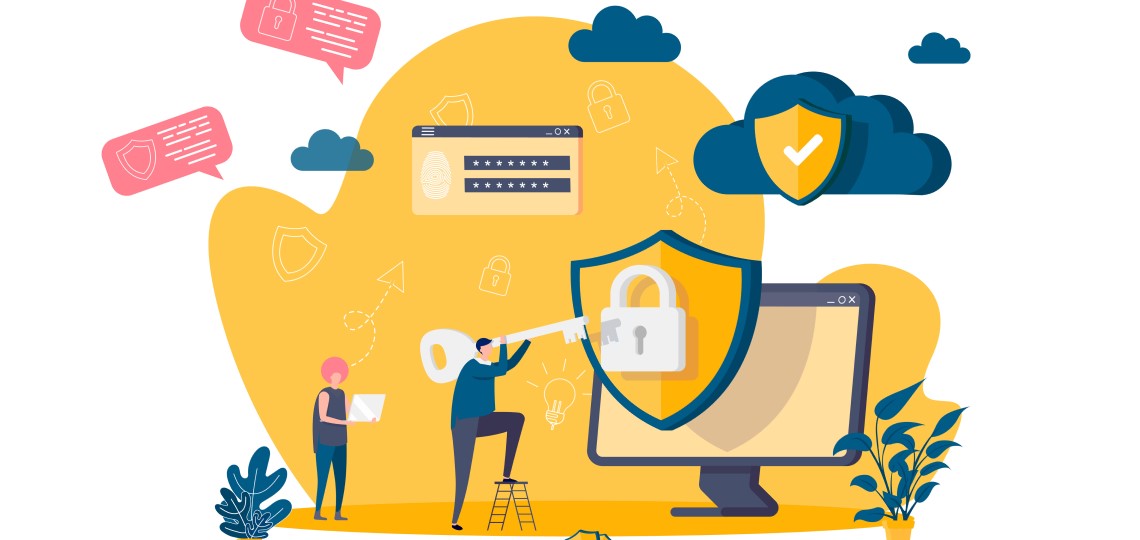Recently we’ve been shining a spotlight on cyber security by producing blogs, adding new products and services and talking to people about how important cyber security is. It won’t be long before all UK IT departments are utilising the latest anti-threat technology, but what can we do to take our own practical steps to protect our employees online?
1. Protect your passwords
How many of us are still using the same password for ALL of our online services and apps? Yes, they are easy to remember… but if they are easy for you to remember, they are easier for hackers to crack!
Think of your passwords like you would a toothbrush – don’t share them, don’t use anybody else’s, and replace them with new ones regularly!
The magic formula is to use a mixture of letters, numbers and special characters. However, if you are finding that your employees are maybe it’s time to give IT department the responsibility
2. Keep an eye out for lurkers
Yes, thats right… lurkers! Lurkers are hackers that are very skilled in going undetected in your workplace. You might find someone coming through the doors of your office block closely behind you, just as you’ve used your key card for entry – and once they are in the building, the repercussions can be catastrophic
3. Lock your screen before someone else does
When you leave your desk, for any length of time, you need to hit ,ALT,. Unless you really want your work to be shared with anyone in the office, you need to make sure that the message you give to all your employees is to lock their computer screens. Not only will this safeguard you against someone placing malware (malicious software) onto your PC, it could also be a serious breach of GDPR. Whichever way you look at it, you could be spending £££ to fix the problem.
4. Save and share
Use a shared drive or cloud software to store important and sensitive data, and make sure you backup your work to a cloud service where will protect critical business data being lost in the event of a cyber attack.
5. Be careful with links
The amount of effort that goes into mimicking a legitimate company with the purpose of obtaining money and/or sensitive business data is huge. You have probably received various emails from courier companies and banks asking you to log on to your account – but very often these emails are phishing emails designed only to cause harm. They look very can often be very suspect.
If you receive an email that you’re not sure about, have a look at where the email has come fromhotguy231 is unlikely to be sending emails from your bank, so if it doesn’t look legitimate, it probably isn’t.
6. Update your computer regularly
When you turn your on and get that all too familiar ‘’ message, the chances are you be in the minority if you clicked on snooze. But did you know that the software updatesare often as result of a cyber threat. You could help your employees by advising them in advance of when a computer update is going to take place, and reiterate the importance of accepting the updates rather than snoozing.
7. Important information should be protected
You should never give out any financial information like bank details and payment information over the phone. Banks are taking steps to remind us that there is certain information which they would never ask for, so when you next get a call that sounds suspicious, its best to hang up and call them back on a legitimate phone number.
8. Stay away from public networks
Public wireless networks can be a in certain situations. They may seem convenient, but they can also present a huge threat to your online safety, so be vigilant when using public wireless networks. Home networks are usually encrypted, making it harder for hackers to get to your information, but public networks aren’t, so use them with caution. Without protection, and with the right software cyber criminals can see:
- Which sites you have visited
- Every text you send out
- Your login information for all sites you visited whilst on the public network
Driving the message home to your employees about the dangers of public networks, will provide extra safety measures to your business.
9. Tidy desk, tidy mind?
That’s what they used to say, untidy desks are unsafe desks when it comes to your business. Making sure you implement a tidy desk policy may ruffle some feathers, but it will go some way to protecting your employees online.
Anything that is written on paper, including passwords for different programs is easy to steal, and hackers are just dying to get their hands on it. Limiting the amount of information on desks will ensure that you are protecting against a possible data breach.
10. It Support teams are there for a reason
It is always better to be safe than sorry, so if you see or hear of any activity that you feel could be suspect, always report it to your IT support teams. Their job is to make sure that the company is protected online, so no information is silly information. It might just make all the difference to your business.
Why Telappliant?
Telappliant is a managed service provider, specialising in providing IT, Cyber, Telecoms, and Connectivity services into small and medium size businesses throughout the UK. We understand the frustrations and seriousness of cyber threats, and have helped many UK organisations stay safe online. You can learn more in our previous blog posts or visit our IT services page to find out how we can help keep

